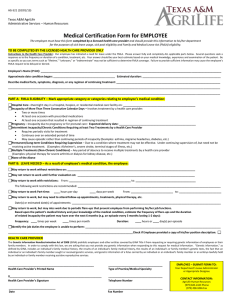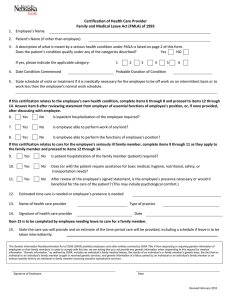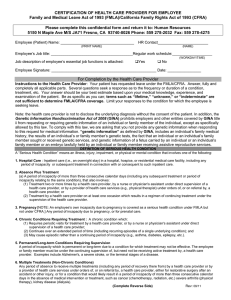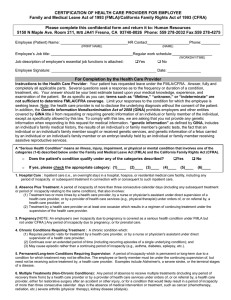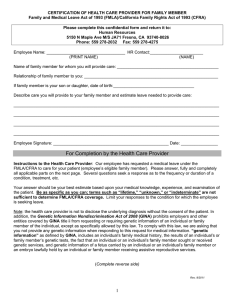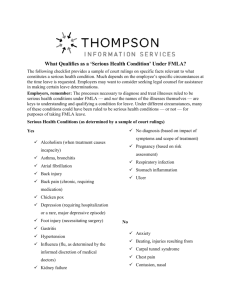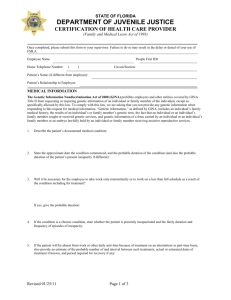PLEASE PRINT
advertisement
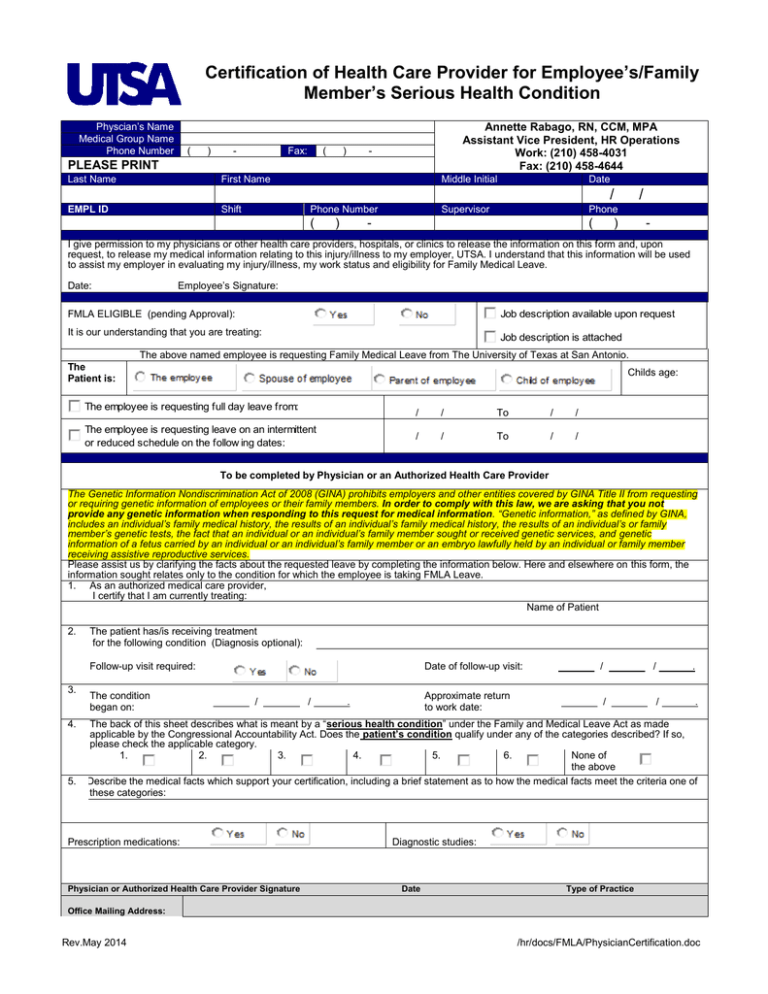
Certification of Health Care Provider for Employee’s/Family Member’s Serious Health Condition Physcian’s Name Medical Group Name Phone Number ( ) - Fax: ( ) Annette Rabago, RN, CCM, MPA Assistant Vice President, HR Operations Work: (210) 458-4031 Fax: (210) 458-4644 - PLEASE PRINT Last Name First Name EMPL ID Shift Middle Initial Date Supervisor Phone / Phone Number ( ) - ( / ) - I give permission to my physicians or other health care providers, hospitals, or clinics to release the information on this form and, upon request, to release my medical information relating to this injury/illness to my employer, UTSA. I understand that this information will be used to assist my employer in evaluating my injury/illness, my work status and eligibility for Family Medical Leave. Employee’s Signature: Date: Job description available upon request FMLA ELIGIBLE (pending Approval): It is our understanding that you are treating: Job description is attached The above named employee is requesting Family Medical Leave from The University of Texas at San Antonio. The Patient is: Childs age: The employee is requesting full day leave from: The employee is requesting leave on an intermittent or reduced schedule on the follow ing dates: / / To / / / / To / / To be completed by Physician or an Authorized Health Care Provider The Genetic Information Nondiscrimination Act of 2008 (GINA) prohibits employers and other entities covered by GINA Title II from requesting or requiring genetic information of employees or their family members. In order to comply with this law, we are asking that you not provide any genetic information when responding to this request for medical information. “Genetic information,” as defined by GINA, includes an individual’s family medical history, the results of an individual’s family medical history, the results of an individual’s or family member’s genetic tests, the fact that an individual or an individual’s family member sought or received genetic services, and genetic information of a fetus carried by an individual or an individual’s family member or an embryo lawfully held by an individual or family member receiving assistive reproductive services. Please assist us by clarifying the facts about the requested leave by completing the information below. Here and elsewhere on this form, the information sought relates only to the condition for which the employee is taking FMLA Leave. 1. As an authorized medical care provider, I certify that I am currently treating: Name of Patient 2. The patient has/is receiving treatment for the following condition (Diagnosis optional): Follow-up visit required: 3. 4. 5. The condition began on: Date of follow-up visit: / / Approximate return to work date: . / / / . / . The back of this sheet describes what is meant by a “serious health condition” under the Family and Medical Leave Act as made applicable by the Congressional Accountability Act. Does the patient’s condition qualify under any of the categories described? If so, please check the applicable category. 1. 2. 3. 4. 5. 6. None of the above Describe the medical facts which support your certification, including a brief statement as to how the medical facts meet the criteria one of these categories: Prescription medications: Physician or Authorized Health Care Provider Signature Diagnostic studies: Date Type of Practice Office Mailing Address: Rev.May 2014 /hr/docs/FMLA/PhysicianCertification.doc Phone #: FAMILY MEDICAL LEAVE ACT: What is a “Serious Health Condition”? A “Serious Health Condition” refers to an illness, injury, impairment, or physical or mental condition that involves the following: 1. Hospital Care Inpatient care (i.e., an overnight stay) in a hospital, hospice, or residential medical care facility, including any period of incapacity or subsequent treatment in connection with or consequent to such inpatient care. Incapacity, for FMLA purposes, is defined as the inability to work, attend school or perform other regular daily activities due to the serious health condition, treatment therefor, or recovery therefrom. 2. Absence Plus Treatment Treatment includes examinations to determine if a serious health condition exists and evaluation of the condition treatment does not include routine physical examinations, or dental examinations. A period of incapacity of more than three consecutive calendar days (including any subsequent treatment or period of incapacity relating to the same condition), that also involves: a) Treatment two or more times by a health care provider, by a nurse or physician’s assistant under direct supervision of a health care provider, or by a provider of health care services (e.g., physical therapist) under orders of, or on the referral by, a health care provider; or b) Treatment by a health care provider on at least one occasion which results in a regimen of continuing treatment under the supervision of the health care provider. A regimen of continuous treatment includes, for example, a course of prescription medication (e.g., an antibiotic) or therapy requiring special equipment to resolve or alleviate the health condition. A regimen of treatment does not include the taking of over-the-counter medications such as aspirin, antihistamines or salves; or bedrest, drinking fluids, exercise, and other similar activities that can be initiated without a visit to a health care provider. 3. Pregnancy Any period of incapacity due to pregnancy or for prenatal care. 4. Chronic conditions requiring Treatments A chronic condition which: a) Requires periodic visits for treatment by a health care provider, or by a nurse or physician’s assistant under direct supervision of a health care provider. b) Continues over an extended period of time (including recurring episodes of a single underlying condition); and c) May cause episodic rather than a continuing period of incapacity (e.g., asthma, diabetes, epilepsy, etc.) but, does not necessarily require a visit to a physician at the time of occurrence. For example, a patient with asthma who has not been advised to stay home when pollen count is high or a pregnant woman with morning sickness. 5. Permanent/Long-Term Conditions Requiring Supervision A period of incapacity which is permanent or long term due to a condition for which treatment may not be effective. The employee or family member must be under the continuing supervision of, but need not be receiving active treatment by, a health care provider. Examples include Alzheimer’s, a severe stroke or the terminal stages of a disease. 6. Multiple Treatments (Non-Chronic Conditions) Any period of absence to receive treatments (including any period of recovery therefrom) by a health care provider or by a provider of health care services under orders of, or on referral by, a health care Rev.May 2014 /hr/docs/FMLA/PhysicianCertification.doc provider, either for restorative surgery after an accident or other injury, or for a condition that would likely result in a period of incapacity of more than three consecutive calendar days in the absence of medical intervention or treatment, such as cancer (chemotherapy, radiation, etc.), severe arthritis (physical therapy) and kidney disease (dialysis). Rev.May 2014 /hr/docs/FMLA/PhysicianCertification.doc
